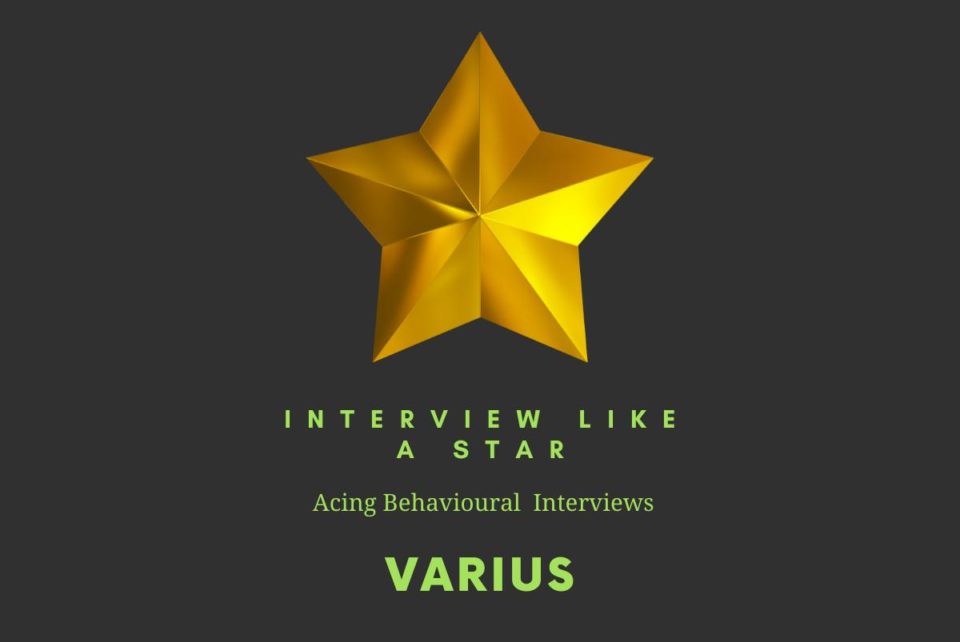
In most interviews, you’ll be asked at least a few behavioural interview questions. They’re easy to identify; they usually start with, “Tell me about a time when …”, or “Give me an example of …”. Behavioural interview questions are intended to help the interviewer understand how you’d deal with certain situations in a new job, based on how you’ve responded with similar situations in the past.
Preparing to answer interview questions is tough; there’s no way to know for sure what you’ll be asked. But there are some very common areas where behavioural interviews tend to focus. The key, then, is to have a few stories in your pocket that cover these common areas. Let’s get started.
Common Question Types
Accomplishments: “Tell me about a time when you were most proud of your work.”
This is the easiest kind of question to answer, because it gives you the opportunity to shine. Having a few of these stories ready to tell is a good idea, because you may be able to use more than one, depending on how questions are asked. Depending on the nature of your job, you might want to think about accomplishments that were related directly to your job function, and ones that were more people-oriented. Having a variety of stories to tell can help the interviewer see different sides of you and your work.
Failure: “Tell me about a time when you weren’t successful.”
This is the flip side of the accomplishment question coin, and as such it’s nowhere near as fun to answer. But everyone misses the mark sometimes, so what happens when you do? Owning up to failure, while uncomfortable, is a sign of professional maturity. Even more important? Learning from it. Make sure your story covers what you learned and changed to ensure that this kind of failure wouldn’t happen again.
Overcoming Obstacles: “Tell me about a time when you overcame a significant challenge.”
This is another kind of accomplishment question, but it’s phrased in a specific way to get at specific information: what happens when you hit an unexpected roadblock? Interviewers are listening for a few other things when they ask this question. One is your response to challenges – do you get frustrated easily, or roll with the punches? The other is your approach to problem solving. These are good things to include in your story if you can.
Difficult Decisions: “Tell me about the most difficult decision you’ve had to make.”
The decisions we make, and the thought process we use to make them, speaks volumes about us. Here, the interviewer will also be listening to understand a few other things. What do you consider to be a difficult decision, and why? When making a decision, do you weigh all the options and risks carefully, or go by your ‘gut’?
Difficult People: “Tell me about a time when you had to deal with a challenging personality.”
Dealing with people is part of almost every job, and sometimes those people aren’t the easiest to get along with. How do you handle that? This is another place where you’ll want to have a few stories, because depending on the nature of your job, interviewers will sometimes specifically ask for examples of coworker, boss, and customer relationships. One important key here: your answer should show that you take responsibility for your half of the challenging relationship.
Story Structure
When it comes to telling the stories that highlight those areas, story structure is important. It helps you build a narrative, so that the story is an interesting and compelling one to the listener. It also helps you remember to include the important elements of a good story. Structuring your story around the acronym ‘STAR’ can help you do exactly that.
S stands for ‘Situation’: What led to the story you’re about to tell?
Was there a problem that needed solving, or a challenge to be overcome? Was the situation caused by an external event of some kind, or was something happening inside the company? What factors made it important?
T stands for ‘Tactic’: When confronted with the situation, what tactic, or strategy, was decided upon?
Did you come up with the plan, either alone or with someone else? What were the factors you had to consider when deciding on the plan? What were the risks if the plan didn’t work? Was there a Plan B?
A stands for ‘Action’: What did you do?
Here, focus on concrete actions. Did you work on your own, or with other people? Did everything go according to plan, or did you have to make course corrections along the way?
R stands for ‘Result’: What happened in the end?
Every great story needs a conclusion – the professional equivalent of ‘they lived happily ever after’. Did you prevent something bad from happening, or fix something that was broken? Did you save the company money or find a new source of revenue? Don’t be afraid to tell a story that doesn’t end well, as long as it helps to support a point you’re trying to get across.
(For some stories – ones that relate a simpler series of events – ‘STAR’ may be overkill. ‘CAR’ is a good alternative in these cases: Context, Action, Result.)
Preparing for behavioural interviews isn’t rocket science. Pick a few great stories from your work history that illustrate some of the most common areas for questioning, and structure your stories well. In no time, you’ll be a behavioural interview … star.
www.variusbusinesssolutions.com | 416-953-0105